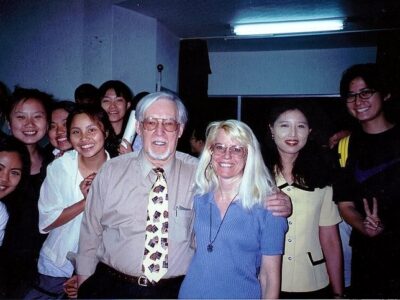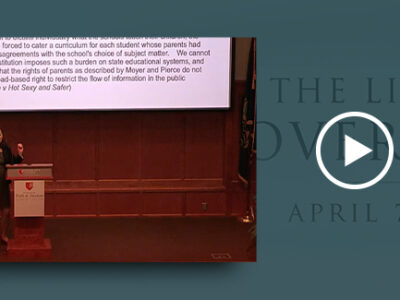Editor’s Note: The “V&V Q&A” is an e-publication from the Center for Vision & Values at Grove City College. Each issue will present an interview with an intriguing thinker or opinion-maker that we hope will prove illuminating to readers everywhere. In this latest edition, the executive director of the Center for Vision & Values, Dr. Paul Kengor, interviews Dr. Charles Kesler, director of the Salvatori Center at Claremont McKenna College, and one of the nation’s most respected and thoughtful observers on the American Founding.
Dr. Paul Kengor: Dr. Charles Kesler, what was so uniquely significant about the American Declaration of Independence, and how and why does it continue to stand apart as an almost sacred political document?
Dr. Charles Kesler: It was, to begin with, the first declaration of independence in diplomatic history.Colonies had broken away from a mother country before, of course, but never by a solemn declaration appealing to natural law and the law of nations, and looking forward to a world of separate but equal sovereignties. In a larger sense, though, our Declaration deserves to be regarded as perhaps the most important civil document in human history.Its only close rival would be the Magna Charta. The U.S. Constitution (another contender) follows upon the Declaration and helps to fulfill its purposes—to secure the natural rights and the Union both proclaimed in 1776.What makes the Declaration so important is not only that it created our country, but also that it announced the principles of just government for every people, based on human equality and freedom.
Kengor: To what degree does the document reflect the philosophy of its author Thomas Jefferson—how much of the document was written by Jefferson? To what extent was Jefferson influenced by other thinkers, such as John Locke?
Kesler: The Declaration came from the Continental Congress, not from Jefferson personally, though he was the chief draftsman. His genius is evident in it, of course, but he himself admitted that it was a statement of the American mind, not of any doctrines peculiar to him. While acknowledging John Locke’s influence, Jefferson pointed to other philosophical sources as well, including Aristotle, Cicero, and Algernon Sidney. One can see John Milton’s inspiration there, too.
Kengor: What was the contribution of John Adams, Ben Franklin, and the Continental Congress?
Kesler: Adams and Franklin and even the Congress were able editors. They gave the document slightly more of a religious dimension than Jefferson would have. Adams knew the philosophical literature as well as or better than Jefferson.
Kengor: How did Jefferson feel about these contributions?
Kesler: Like many a writer, he resented his editors!
Kengor: About 10 years I took part in the Salvatori program on the American Founding at the Heritage Foundation, where a bunch of us young professors had the pleasure of hearing your wisdom on the Founders and the Declaration. I recall that you noted that the Declaration of Independence was much more than simply a declaring of independence by one people or country from another. Among other things, you said that Jefferson and crew were writing to a much broader audience, namely to the entire world, and perhaps even to history. You said that this was also a declaration of “just war.” Could you elaborate on that?
Kesler: The Founders were appealing to the world for help in their war for independence. They looked especially to the French and the Dutch for assistance. The authors of the Declaration therefore had to show not only that their cause was justified by the law of nations, but also that, if they won their just war, they would not subsequently reconsider and rejoin the United Kingdom on better terms. That’s why they go to such pains to denounce George III as a tyrant, not just an errant king.
Kengor: Is this also a religious document? How often is God mentioned, and in what forms? Who is responsible for those mentions of God?
Kesler: God is mentioned four times in the document, as Creator and as a legislator (“the laws of nature and of nature’s God”), executive (“Divine Providence”), and judge (“Supreme Judge of the world”). This is not the clock-maker god of the Enlightenment. Most of the references were introduced by others, but Jefferson himself said that he believed in a creator God who also rewards the good and punishes evil-doers.
Kengor: Was it necessary to mention God?
Kesler: Depends on what you mean by necessary. They didn’t have to do it. But God crowns the logic of the Declaration’s argument—and besides, it’s always good to have Him on your side!
Kengor: In November 2004 there was a case in a public school in the San Francisco Bay area in which a teacher claimed that the school principal prohibited him from using the Declaration (and other Founding documents) because it mentioned God. If accurate, was this merely an isolated case of silly secularists in a public school who lost their minds—and thus of little concern to us—or does it point to a real problem that we should be worried about? Is there a prejudice against the religious component in these documents?
Kesler: There is such a prejudice, and it’s worrying. Alongside that prejudice is another one against moral truth itself. But they don’t see that if reason cannot ascertain any moral truths, then their own claim collapses. How can your rights be violated if you don’t have any rights to begin with?
Kengor: What about the teaching of the Declaration in our schools today, from high schools to colleges? We often hear allegations from conservatives that the Federalist Papers are not being taught, or at least not adequately respected. What’s your sense of how the Declaration is treated and represented? Is it bashed as a narrow, bigoted document written by and for white European males?
Kesler: Yes, it is bashed frequently along those lines—check out Howard Zinn’s book, for example—only to be strangely rehabilitated when the teacher takes up the history of the civil rights movement.
Kengor: Is it true that America needed Abraham Lincoln to realize the full potential of the Declaration for all Americans, especially black Americans?
Kesler: Lincoln helped to save the Declaration from becoming, at the hands of Stephen Douglas and others, an un-revolutionary or even anti-revolutionary document of white power and naked majority rule. Lincoln fought to save the Declaration’s original meaning of human equality and liberty. He did not invent a new, evolving, Progressive meaning for it, as Garry Wills and others have claimed.
Kengor: Lastly, where does the Declaration—and, more so, its ideals—travel from here? Of what consequence is the Declaration of Independence to not merely Americans but to all humanity? Is there a place for Thomas Jefferson in Baghdad, Cairo, or Kabul?
Kesler: The rights to life, liberty, and the pursuit of happiness are inherent in every human being, but the capacity to vindicate and live by those rights requires cultivation. Republican government does not come easy to every people, as the experiment in Iraq is proving. Freedom has its habits of heart and mind. The Declaration can help point the way for other peoples, however—a point that Adams and Jefferson and the whole founding generation would heartily affirm.
Kengor: Dr. Kesler, thanks for talking to “V&V Q&A.” We look forward to hearing your lecture next week in Pittsburgh.
Kesler: Thank you.




